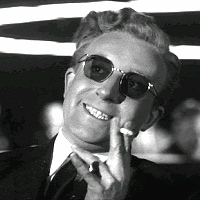
Dr. Strangelove
CBUB Wins: 0
CBUB Losses: 1
CBUB Ties: 0
Win Percentage: 0%
Added by: Maestro
Read more about Dr. Strangelove at: Wikipedia
Official Site: Columbia Tristar/Sony Pictures
Dr. Strangelove or: How I Learned to Stop Worrying and Love the Bomb (commonly known as Dr. Strangelove) is a 1964 black comedy film directed, produced, and co-written by Stanley Kubrick, starring Peter Sellers and George C. Scott, and featuring Sterling Hayden, Keenan Wynn, Slim Pickens, and Tracy Reed. Loosely based on Peter George's Cold War thriller novel Red Alert, a.k.a. Two Hours to Doom, Dr. Strangelove satirized the nuclear scare.
The story concerns an unhinged United States Air Force general who orders a first strike nuclear attack on the Soviet Union, and follows the President of the United States, his advisors, the Joint Chiefs of Staff and a Royal Air Force (RAF) officer as they try to recall the bombers to prevent a nuclear apocalypse, as well as the crew of one B-52 as they attempt to deliver their payload.
In 1989, the United States Library of Congress deemed the film "culturally significant" and selected it for preservation in the National Film Registry. It was listed as number three on AFI's 100 Years... 100 Laughs.
In the "War Room" at The Pentagon, General Buck Turgidson (George C. Scott) briefs President Merkin Muffley (Sellers). He reports that Ripper apparently took advantage of "Wing Attack Plan R", a wartime contingency plan which is intended to give Field Commanders authority to retaliate with nuclear weapons in the event that a Soviet first strike obliterates Washington, D.C. and incapacitates U.S. leadership. When President Muffley scoffs at the idea that such an option was ever considered, he is reminded that he supported and endorsed the plan when it was first proposed. When President Muffley states that General Turgidson had assured him that the "Human Reliability Program" would make it impossible that a Field Commander would exceed his authority in this manner, the General responds that he doesn't "think it's quite fair to condemn a whole program because of a single slip-up".
CBUB Match Record:
| Result | Opponent | My Score | Their Score | |
|---|---|---|---|---|
| Loss | Dr. Hugo Strange | 44 | to | 53 |
No Fantasy Draft Records Available
